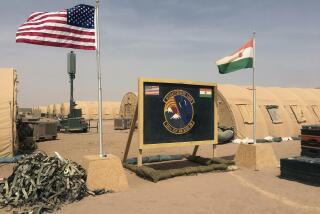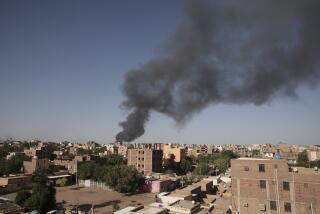Somali Beach Calm as Final Pullout Starts : Africa: U.S. and Italian troops consolidate positions, Bangladeshis depart. More U.N. peacekeepers set to leave.
- Share via
MOGADISHU, Somalia — Americans dug into the sand along a razor-wire perimeter of Mogadishu’s beachfront Tuesday. On the other side of the wire coils, an eerie quiet settled over a violent landscape.
“It would make anyone wonder if this is the calm before the storm,” said Army Special Forces Maj. Bryan Whitman.
Under a relentless tropical sun, about 1,800 U.S. Marines and 350 of their Italian counterparts consolidated their hold on the sand of Mogadishu, providing protection for the retreat of U.N. peacekeeping forces from Somalia.
By 9 a.m. on the first full day of the U.S.-commanded evacuation, 900 Bangladeshi peacekeepers had boarded two cramped, rundown ferries and left for home after their long and unsuccessful attempt to bring order to this capital.
Without serious incident, U.S. Marines assumed temporary control of the Bangladeshi bunkers guarding Mogadishu’s port.
Today, about 1,500 Pakistanis with 70 armored vehicles must retreat from their advanced positions surrounding the adjacent airport.
Their retreat will open the airport to Somalis--and provide the world a clue to this troubled country’s future. Americans anticipate that mobs of desperate Somalis will move in behind U.N. peacekeepers to loot the airport and nearby U.N. properties. Worse, the sudden evacuation of this choice real estate could trigger an all-out battle among Mogadishu’s warring clans for control.
No matter what, once the Pakistanis have loaded aboard ships, Italian and U.S. Marines will, if all goes well, follow Thursday and retreat to a 23-ship task force offshore. And that will open the second choice property, the port.
It will also leave the Somalis, long dependent on outside relief and assistance, isolated from a world that has now forsaken them.
“We’re setting up for the big show that’s going to happen sooner or later,” said Marine Lt. Craig Price. His 1st Platoon, A Battery of the 11th Marines spent Tuesday filling sandbags and digging bunkers. The troops peered warily across the runway in front of them that soon will return to Somali control.
“I think they’d be out of their minds to come over here and mess with us,” Price said.
For two days in advance of the Marine arrival, heavy and intermittent clan fighting occurred within sight of the city’s beachfront, spraying the sand and machinery with stray bullets.
But Tuesday, only isolated gunfire was heard through the city, and the crowds that normally gather outside the airport and seaport were uncommonly small.
“A quiet Mogadishu is a happy Mogadishu,” said Marine Maj. John Allison, a headquarters watch officer. “As long as the Somalis don’t do anything, it’s going to stay pretty much like this.”
Some military veterans said the Americans, thus far, had kept the Somali clan fighters at bay with a show of force, which included a flotilla of ships offshore, fixed-wing gunships overhead and visible artillery positions.
The United States and the United Nations have invested 150 lives and $2 billion in Somalia in the last 2 1/2 years. After assisting with the recovery from famine, the United Nations tried without success to bring clan leaders together to form a government. All along, the peacekeepers have managed to keep open the seaport and airport that nourish this arid city.
Now there is great anxiety: Will Somali clans resume fighting, even if their lifeline to the rest of the world is jeopardized?
“Without the port, Mogadishu as a city becomes practically uninhabitable,” said U.S. envoy Daniel Simpson.
More to Read
Sign up for Essential California
The most important California stories and recommendations in your inbox every morning.
You may occasionally receive promotional content from the Los Angeles Times.













